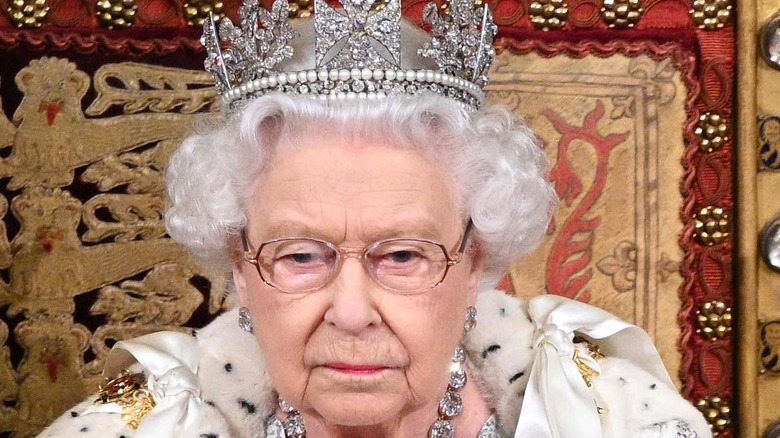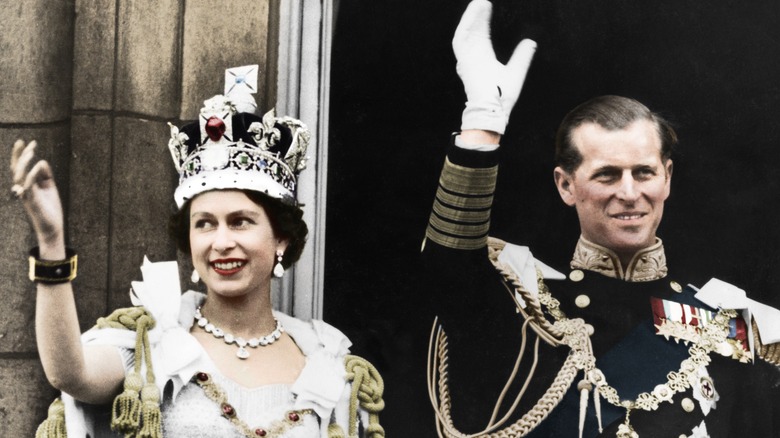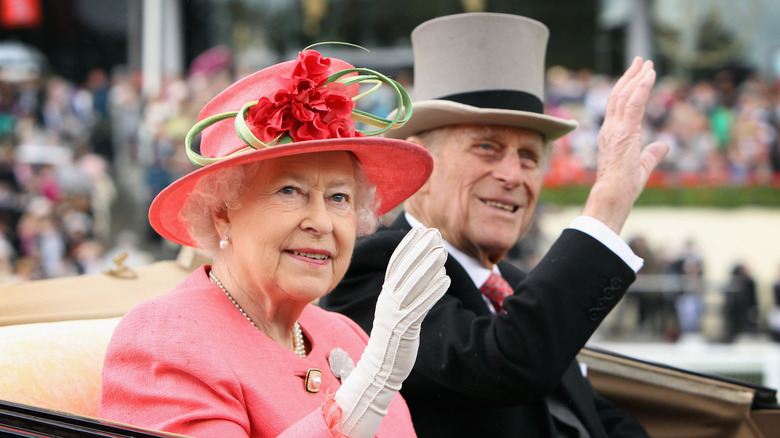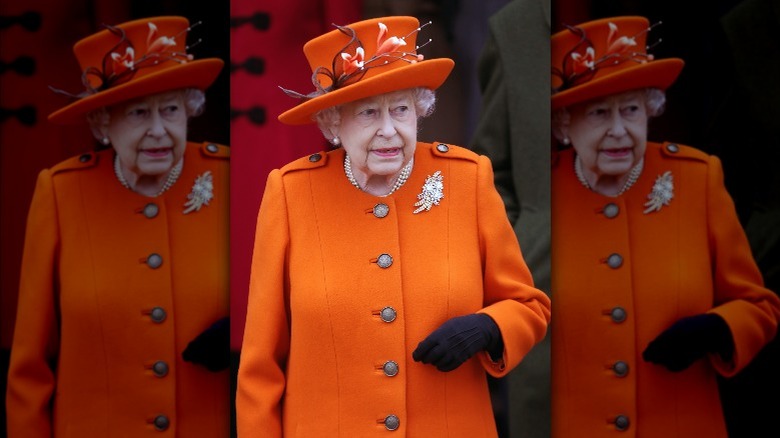Why British Grief Over The Queen's Death Will Be Historic
The June 2022 Platinum Jubilee festivities for Queen Elizabeth were both spectacular and poignant. It was a fitting celebration of the queen's 70 years on the British throne, but at the same time, it was a farewell of sorts. With the monarch's age increasing, Britons know that the day will eventually come when the palace will send the code message to the prime minister: "London Bridge is down." This is how the world will learn of Queen Elizabeth's death.
The 10 days that will follow will be an elaborate series of events leading up to the coronation of Prince Charles, according to Politico. Flags will be immediately flown half-staff, and muffled church bells will toll. During the four-day period in which the queen will lie in state, Prince William and Prince Harry will briefly keep watch over their grandmother's casket in a ceremony known as "The Vigil of the Princes" (expect to hear lots of gossip about either a reconciliation or a continued frostiness between the brothers).
Most of all, England will be in a period of deepest mourning to rival even that of Princess Diana's death. London may be practically shut down by the influx of visitors, and social media will be flooded with tributes and memories. Per Reader's Digest, British TV networks will go into nonstop news mode, and comedy shows will be out of the question on the day the queen dies. In short, the national grief will be positively historic, and for good reason.
Deep grief will help the UK move forward
If the idea of observing a period of such deep mourning seems excessive, consider this: Queen Elizabeth was crowned in 1952 at age 25. Anyone alive at the time has few to no memories of her father, King George VI. Unlike other heads of state who have come and gone, the queen has been a constant presence in the lives of most of the world, and her death will leave a huge void.
British history professor Nicoletta Gullace of the University of New Hampshire spoke to Reader's Digest about the likely response to the queen's passing. "The death of the monarch who has reigned for the entirety of most Britons' lives, and for as long as nearly everyone can remember, will be a moment of tremendous grief, unmooring people from Britain's past and from all they have ever known," she said. "We must expect it to be overwhelming, and I think we are likely to see a tremendous emotional outpouring from a traditionally stoic people."
The grieving process also serves a psychological purpose. As grief expert John Frederick Wilson told The Conversation, a death disrupts our sense of stability and familiarity. But giving ourselves time to mourn allows us to adapt to life without the loved one. He adds, "Indeed, one of the privileges of working with grief is watching how so many clients learn and grow from the experience and emerge from their grief better equipped to deal with future losses."
London will swell with the influx of Queen Elizabeth's mourners
There's another way in which the grief over Queen Elizabeth's death will be historic — the influx of visitors to London is set to be absolutely record-breaking. According to Politico, "unprecedented" crowds are expected to descend upon the capital city to pay their respects, from all over the world, which could cause "travel chaos" and may even lead to London becoming "full," per one official memo that was circulated — though it remains to be seen exactly how many people would have to be there for this to happen.
Per BBC News, approximately 200,000 mourners showed up when the Queen Mother passed away in 2002. Given how beloved her daughter is, especially outside Britain itself, that number is expected to be considerably higher since people will be traveling from all over. Furthermore, Reader's Digest Canada notes an incredible thirty feet of flowers, encompassing tens of thousands of bouquets, were laid at Kensington Palace following Princess Diana's death, so London may also be overwhelmed with greenery when the time comes.
When will the rest of the world find out Her Majesty has passed?
The British Prime minister will be the first to learn of the queen's death, but the rest of us will have to wait slightly longer to find out. Thankfully, as The Guardian points out, ordinary Britons will be told much faster than they were back in the day, even if it isn't immediate. In 1952, when George VI passed away, it was four hours before the BBC announced the news. Princess Diana's death, meanwhile, was confirmed within just 15 minutes.
Although the BBC once had a monopoly on royal deaths, when Her Majesty passes, the news will go out widely to the Press Association, meaning global media outlets will all receive it simultaneously. A note will be posted to the gates of Buckingham Palace, while the palace's official website will also confirm the sad news with the same text presented on a dark background, further signifying the mourning period has begun (via The Guardian).
As The Mirror notes, the U.K. will mourn for 12 days total, while other sources say there will be a 10-day mourning period. However, Britons will only get one day off work, as an extra bank holiday. Likewise, the London Stock Exchange will be shut for business on the day of the queen's funeral, and possibly even for another few days afterward, as a sign of respect.



